#chinese name
I think I meant to share this in my Chinese names resources posts, but I guess I forgot! If you like learning about Chinese names, you absolutely must check this article out.
What can we tell from the evolution of Han Chinese names?

The highlight of this article is its amazing interactive graphics. Below is an example of one showing the top characters in male given names in different decades. As you can see, hovering over a character shows additional information.

There’s also a series of graphics that dive more in depth into each decade. I love seeing which characters occur together most!
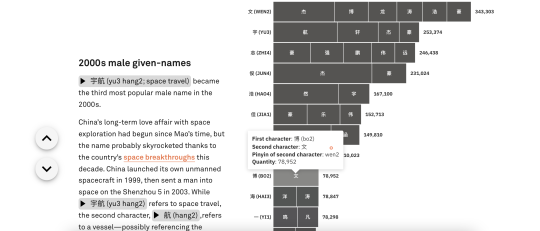
Make sure you use the arrows to see the data for female names too.

Lastly, you can see how the characters in your Chinese name rank.
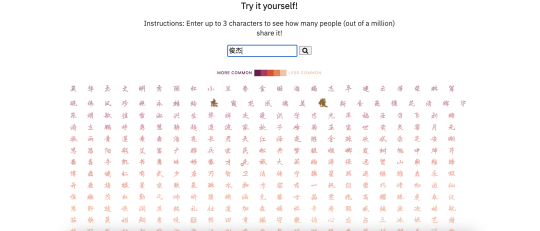
Now go forth and nerd out, fellow name nerds!
According to this list, these are the top 10 surnames in China as of 2020*:
- 李 Lǐ
- 王 Wáng
- 张 Zhāng
- 刘 Liú
- 陈 Chén
- 杨 Yáng
- 赵 Zhào
- 黄 Huáng
- 周 Zhōu
- 吴 Wú
I’ve seen articles like this one discussing the regional distribution of surnames. I wanted to take a look myself and compare the top surnames in different provinces/municipalities. For instance, do any locations have a top 10 list that is the same as the overall country top 10? Which surname is ranked #1 in the most locations? Let’s explore and have some fun along the way.
*The top surnames for 西藏 Tibet are not included. I believe this is because the population is vast majority Tibetan.
1) Find how many surnames in a location’s top 10 are also in the national top 10.
Most in common

Arrows: grey = same as national rank, green = higher than national rank, red = lower than national rank
Circles: orange = in national top 10 but missing from top 10 of individual location, blue = outside national top 10
- 四川 Sichuan - 9/10 surnames
Missing: 赵 Zhào
Added: 罗 Luó - 贵州 Guizhou - 9/10 surnames
Missing: 赵 Zhào
Added: 罗 Luó
Fewest in common

- 浙江 Zhejiang - 6/10 surnames
Missing: 杨 Yáng, 赵 Zhào, 黄 Huáng & 周 Zhōu
Added: 林 Lín, 叶 Yè, 郑 Zhèng & 徐 Xú - 广西 Guangxi - 6/10 surnames
Missing list: 赵 Zhào, 黄 Huáng, 周 Zhōu & 吴 Wú
Added: 梁 Liáng, 韦 Wéi, 陆 Lù & 卢 Lú - 上海 Shanghai - 6/10 surnames
Missing: 刘 Liú, 杨 Yáng, 赵 Zhào & 黄 Huáng
Added: 朱 Zhū, 徐 Xú, 沈 Shěn & 陆 Lù
2) Find the average national rank for each location’s top 10 list.
OK, this section is a little confusing. Basically, I was thinking that just counting overlapping surnames this isn’t necessarily the best metric. When it comes to surnames outside the national top 10, just counting like I did above can’t distinguish a rank of 100 from a rank of 11! So I decided to take averages.
For each location, I found the national rank of the its top 10 surnames and averaged them. This should give me an idea of which location’s top 10 surnames collectively rank the highest in the whole country. If you add up 1-10 and divide by 10, you get an average of 5.5, so that would be the minimum possible average.
Lowest average
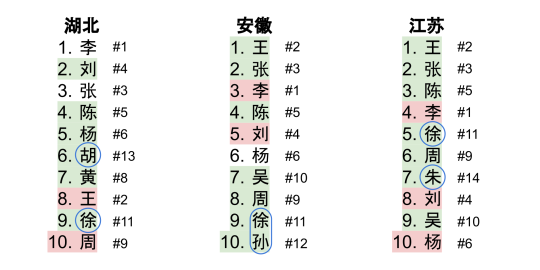
Highlighting: red = lower than national rank, green = higher than national rank, no highlighting = same as national rank
Blue circling = outside of national top 10
Annotated numbers = national rank
- 湖北 Hubei - 6.2 average
Outside national top 10: 胡 Hú & 徐 Xú - 安徽 Anhui - 6.3 average
Outside national top 10: 徐 Xú & 孙 Sūn - 江苏 Jiangsu - 6.5 average
Outside national top 10: 徐 Xú & 朱 Zhū
Highest average
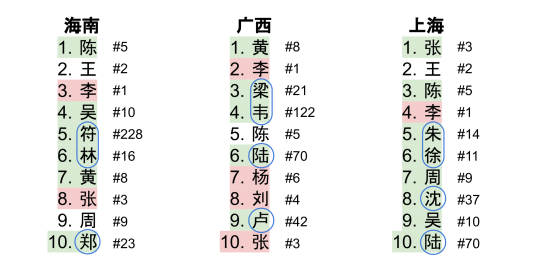
- 海南 Hainan - 30.5 average
Outside national top 10: 符 Fú, 林 Lín & 郑 Zhèng - 广西 Guangxi - 28.2 average
Outside national top 10: 梁 Liáng, 韦 Wéi, 陆 Lù & 卢 Lú - 上海 Shanghai - 16.2 average
Outside national top 10: 朱 Zhū, 徐 Xú, 沈 Shěn & 陆 Lù
3) Add the difference in rank of surnames for each location to create a composite score.
Then I started to think about order within the top 10. After all, a province for which 李 Lǐ ranks #10 should be treated differently from one where 李 Lǐ is #1. So I wanted to capture the difference between a surname’s national rank and its rank for individual locations.
For example, in 广东 Guangdong, 陈 Chén ranks #1, but it’s #5 in the whole country. The difference is 5 - 1 = 4. I did this for the other 9 surnames in 广东 Guangdong’s top 10 as well and added the numbers to get a composite score. Then I repeated this for the other locations.
I used absolute values—otherwise a positive difference and negative difference would offset each other! But I used + and - signs in the images below to show more information. You could also divided by 10 to get the average difference for the top 10 surnames each location.
Lowest score
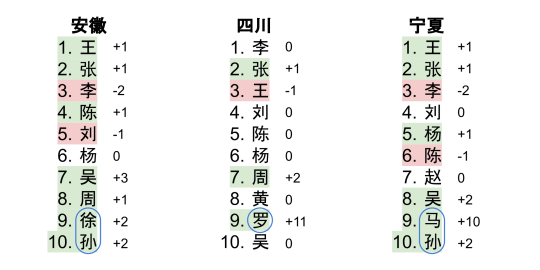
Highlighting: red = lower than national rank, green = higher than national rank, no highlighting = same as national rank
Blue circling = outside of national top 10
Annotated numbers = difference b/t national rank and local rank, with (+) indicating a higher rank locally and (-) indicating a lower rank locally
- 安徽 Anhui - 14 score
- 四川 Sichuan - 15 score
- 宁夏 Ningxia - 20 score
Highest score
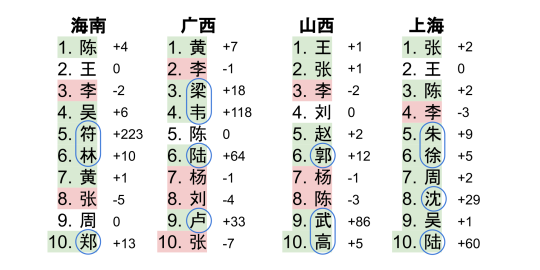
- 海南 Hainan - 264 score
- 广西 Guangxi - 253 score
- 山西 Shanxi - 113 score
- 上海 Shanghai - 113 score
4) For each location, determine how many surnames have no difference in rank.
As an extension of the above, for each location, I counted the number of top 10 surnames that had no difference in rank compared to the national rank. Let’s look closer at locations whose top 10 lists had the fewest changes:
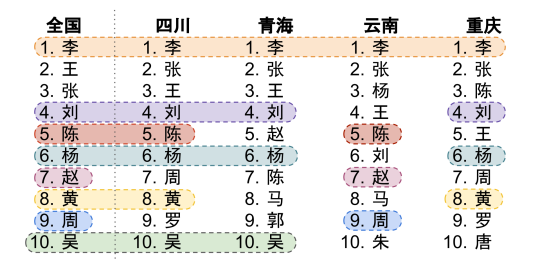
- 四川 Sichuan - 6 surnames
李 Lǐ, 刘 Liú, 陈 Chén, 杨 Yáng, 黄 Huáng & 吴 Wú - 青海 Qinghai - 4 surnames
李 Lǐ, 刘 Liú, 杨 Yáng & 吴 Wú - 云南 Yunnan - 4 surnames
李 Lǐ, 陈 Chén, 赵 Zhào & 周 Zhōu - 重庆 Chongqing - 4 surnames
李 Lǐ, 刘 Liú, 杨 Yáng & 黄 Huáng
I’ll also list the locations for which no surnames had the same rank as in the top 10:
- 广东 Guangdong
- 福建 Fujian
- 江西 Jiangxi
- 江苏 Jiangsu
- 贵州 Guizhou
Summary: Which location’s top 10 is closest to the national top 10?
We just saw several different ways of looking at this. Someone who is better at math than I am would probably devise a way to combine the different metrics into a single score. I’m just going to recap which locations we saw appear the most.
Overall most similar: 四川 Sichuan & 安徽 Anhui
Overall least similar: 广西 Guangxi, 上海 Shanghai & 海南 Hainan
5) Find which surnames appear on the most and least location top 10 lists.
This wasn’t something I was initially curious about, but after my analyses above, I grew curious. I’m just looking at the national top 10 surnames here. There are 30 locations total, so 30 is the highest possible number.

So 李 Lǐ and 张 Zhāng are the only two that appear in the top 10 for all 30 locations!
I also thought it would be interesting to see which locations are missing for the surnames that were close to 30/30:
- 陈 Chén - 29/30
Missing: 新疆 Xinjiang - 王 Wáng - 28/30
Missing: 广东 Guangdong & 广西 Guangxi - 刘 Liú - 28/30
Missing: 海南 Hainan & 上海 Shanghai - 杨 Yáng - 26/30
Missing: 海南 Hainan, 浙江 Zhejiang, 江西 Jiangxi & 上海 Shanghai
6) Which surname ranks 1st in the most locations?
This questions grew pretty naturally off of the question above. I spent far too long making this map to go along with the numbers!
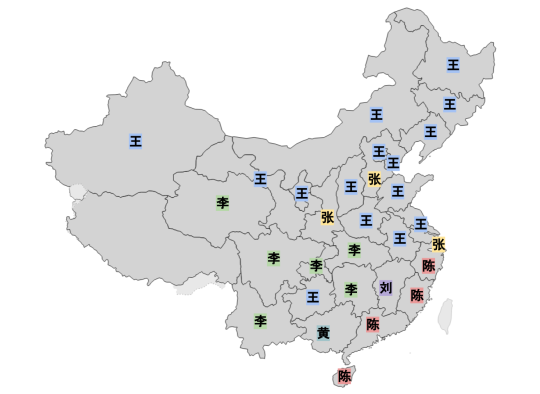
The winner is…王 Wáng with 15 locations! It’s so interesting to see how 王 Wáng is dominant in the north, 陈 Chén rules the southern coast, etc.
- 王 Wáng - 1st in 15 locations
- 李 Lǐ - 1st in 6 locations
- 陈 Chén - 1st in 4 locations
- 张 Zhāng - 1st in 3 locations
- 刘 Liú - 1st in 1 location
- 黄 Huáng - 1st in 1 location
The winner is…王 Wáng with 15 locations!
7) Mainland China vs. Taiwan vs. Hong Kong
I thought this would be an interesting comparison. I wanted to include Macau as well, but I had difficulty finding a list. Here is the Hong Kong data source.
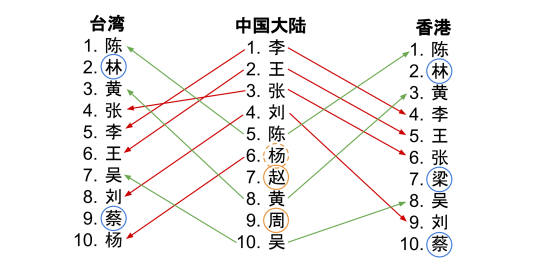
Arrows: green = higher than Mainland rank, red = lower than Mainland rank
Circles: orange = in Mainland top 10 but missing from the HK and/or TW top 10, blue = outside Mainland top 10
I was actually surprised how similar the top 10s are for Taiwan and Hong Kong!
I also wanted to compare Taiwan and Hong Kong to Fujian and Guangdong, respectively. These are the two provinces in Mainland China that they are closest to.
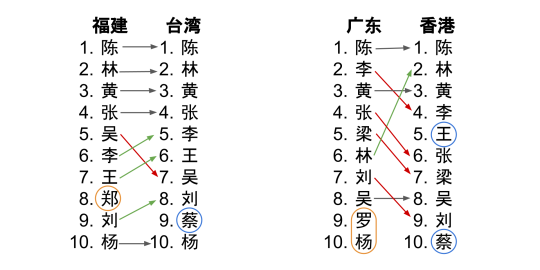
Now, I’m no history expert, but I know that a lot of Taiwanese have roots in Fujian, so it makes a lot of sense that their top 10 lists look so similar. I don’t know much about the history of migration to Hong Kong, but as such a major economic center, I’m guessing people from all over China came to Hong Kong.
Thank you!
If you actually read this whole post, I’m impressed. Thank you!
I initially began working on this post in September 2021. Needless to say, this post ended up being a lot longer and taking up a lot more of my time than I had anticipated. I asked my dad to read over an earlier draft of this post for me, and he literally asked me, “why are you doing this?” I didn’t really have a concrete answer. I just thought it would be interesting to explore surnames a bit. And so here we are :)
Extended list - 大陆25大姓氏
- 李 Lǐ
- 王 Wáng
- 张 Zhāng
- 刘 Liú
- 陈 Chén
- 杨 Yáng
- 赵 Zhào
- 黄 Huáng
- 周 Zhōu
- 吴 Wú
- 徐 Xú
- 孙 Sūn
- 胡 Hú
- 朱 Zhū
- 高 Gāo
- 林 Lín
- 何 Hé
- 郭 Guō
- 马 Mǎ
- 罗 Luó
- 梁 Liáng
- 宋 Sòng
- 郑 Zhèng
- 谢 Xiè
- 韩 Hán
A Closer Look at Chinese Names
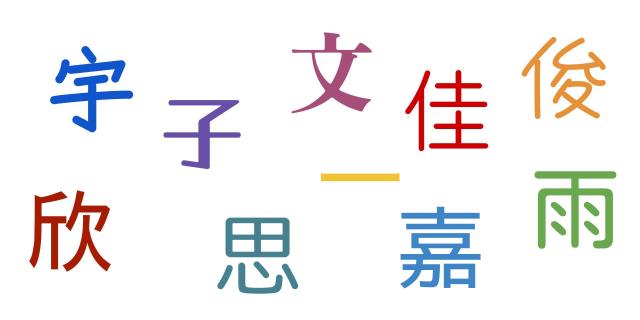
This post has been a long time coming. In spring 2020, I posted two of the most popular posts on this blog:
Reading Chinese Names: Female Names
Reading Chinese Names: Male Names
More recently I have wanted to revisit the idea behind those posts but with a different, more in-depth approach. I also made some decisions while compiling data for those posts that I now regret. So in late summer 2021, I set out to completely redo my data collection with the eventual goal of creating this very post.
About the Data
I will include more information about my data collection process at the end of this post for those interested.
I gathered 3,277 names (1602 male, 1675 female) from idol shows and groups. In the grand scheme of things, this is not a lot of names at all. But I think it’s enough that we can explore names, observe some generalities, and have fun! These names belong to individuals roughly 15-30 years old. Most names belong to individuals from Mainland China, but there are some Hong Konger and Taiwanese names as well.
Some of the name sources include:
- 偶像练习生/青春有你
- 创造101/创造营
- 明日之子
- 以团之名/少年之名
- SNH48
- 快乐女声/快乐男声
- 菱格世代DD52
- Various groups like 时代少年 and SING女团
I also wanted to note something important: the definitions I am using (via MDBG) are only the surface. For example, a name containing a character meaning jade might also have implications of beauty and virtue. So the meaning is more than just “jade.” However, it just isn’t practical to go into all the nitty gritty here. I encourage you to seek out more resources if you are interested.
Some Thanks
Thanks so much to @liu-anhuaming,@meichenxi, and my friend Tiffany for their help and advice during the process of creating this post! 非常感谢你们,你们是最棒的!
Given Names (Overall)

First let’s look at the most common characters for ALL the given names in the dataset. There were 1093 total unique characters across all the given names. I’m going to include more characters (almost rounding out the top 100) at the bottom of this post for those interested. There is also some information broken down by gender below.
Top Given Name Characters
- 宇 yǔ - room, universe / 87
- 子 zǐ - son, child, seed, egg, small thing, 1st earthly branch, midnight, 11th solar month, year of the Rat, fourth of five orders of nobility, ancient Chinese compass point / 82
- 佳 jiā - beautiful, fine, good / 68
- 雨 yǔ - rain / 63
- 嘉 jiā - excellent, auspicious, to praise, to commend / 59
- 文 wén - language, culture, writing, formal, literary, gentle / 58
- 欣 xīn - happy / 55
- 一 yī - one, 1, single, a (article), as soon as, entire, whole, all, throughout / 51
- 俊 jùn - smart, eminent, handsome, talented / 51
- 思 sī - to think, to consider / 49
- 杰 jié - hero, heroic, outstanding person, prominent, distinguished / 49
- 豪 háo - grand, heroic / 48
- 怡 yí - harmony, pleased / 45
- 天 tiān - day, sky, heaven / 44
- 泽 zé - pool, pond, (of metals etc) luster, favor or beneficence, damp, moist / 43
- 琪 qí - fine jade / 40
- 婷 tíng - graceful / 39
- 鑫 xīn - prosperity / 38
- 晓 xiǎo - dawn, daybreak, to know, to let sb know, to make explicit / 35
- 浩 hào - grand, vast (water) / 35
- 晨 chén - morning, dawn, daybreak / 34
- 恩 ēn - favor, grace, kindness / 33
- 博 bó - extensive, ample, rich, obtain, aim, to win, to get, plentiful / 32
- 慧 huì - intelligent / 32
- 明 míng - bright, clear, to understand, wise / 32
- 轩 xuān - pavilion with a view, high, tall / 32
- 辰 chén - 5th earthly branch, 3rd solar month, year of the Dragon, ancient Chinese compass point / 32
Top Given Name Characters (Female)
- 佳 jiā - beautiful, fine, good / 56
- 雨 yǔ - rain / 50
- 欣 xīn - happy / 49
- 怡 yí - harmony, pleased / 44
- 婷 tíng - graceful / 39
- 嘉 jiā - excellent, auspicious, to praise, to commend / 37
- 琪 qí - fine jade / 35
- 思 sī - to think, to consider / 33
- 慧 huì - intelligent / 31
- 梦 mèng - dream, to dream / 30
Top Given Name Characters (Male)
- 宇 yǔ - room, universe / 68
- 子 zǐ - son, child, seed, egg, small thing, 1st earthly branch, midnight, 11th solar month, year of the Rat, fourth of five orders of nobility, ancient Chinese compass point / 55
- 豪 háo - grand, heroic / 48
- 杰 jié - hero, heroic, outstanding person, prominent, distinguished / 47
- 俊 jùn - smart, eminent, handsome, talented / 45
- 泽 zé - pool, pond, (of metals etc) luster, favor or beneficence, damp, moist / 38
- 浩 hào - grand, vast (water) / 35
- 一 yī - one, 1, single, a (article), as soon as, entire, whole, all, throughout / 34
- 文 wén - language, culture, writing, formal, literary, gentle / 32
- 明 míng - bright, clear, to understand, wise / 27
Single-Character Names (单名)

There were 668 single-character names, which is about 20% of the total names. I know that 单名 are pretty rare in Taiwan (I’m not sure about Hong Kong), so that’s something to keep in mind. More of the top 单名 are at the bottom of this post.
Top Single-Character Names
- 鑫 xīn - prosperity / 12
- 欣 xīn - happy / 10
- 洋 yáng - ocean, vast, foreign, silver dollar or coin / 9
- 静 jìng - still, calm, quiet, not moving / 7
- 丹 dān - red, pellet, powder, cinnabar / 6
- 娜 nà - graceful, elegant, beautiful / 6
- 恩 ēn - favor, grace, kindness / 6
- 敏 mǐn - quick, nimble, agile, clever, smart / 6
- 昕 xīn - dawn / 6
- 雪 xuě - snow / 6
- 颖 yǐng - head of grain, husk, tip, point, clever, gifted, outstanding / 6
Female Single-Character Names
- 欣 xīn - happy / 9
- 鑫 xīn - prosperity / 8
- 静 jìng - still, calm, quiet, not moving / 7
- 丹 dān - red, pellet, powder, cinnabar / 6
- 娜 nà - graceful, elegant, beautiful / 6
- 敏 mǐn - quick, nimble, agile, clever, smart / 6
- 雪 xuě - snow / 6
- 倩 qiàn - pretty, winsome / 5
- 洁 jié - clean / 5
- 颖 yǐng - head of grain, husk, tip, point, clever, gifted, outstanding / 5
Male Single-Character Names
- 洋 yáng - ocean, vast, foreign, silver dollar or coin / 7
- 恩 ēn - favor, grace, kindness / 5
- 杰 jié - hero, heroic, outstanding person, prominent, distinguished / 5
- 宇 yǔ - room, universe / 4
- 浩 hào - grand, vast (water) / 4
- 涛 tāo - big wave / 4 (Taiwan pr. táo)
- 硕 shuò - large, big / 4
- 磊 lěi - lumpy, rock pile, uneven, sincere, open and honest / 4
- 立 lì - to stand, to set up, to establish, to lay down, to draw up, at once, immediately / 4
- 耀 yào - brilliant, glorious / 4
- 聪 cōng - wise, clever, sharp-witted, intelligent, acute, quick at hearing / 4
- 超 chāo - to exceed, to overtake, to surpass, to transcend, to pass, to cross, ultra, super / 4
- 鑫 xīn - prosperity / 4
- 鹏 péng - large fabulous bird / 4
Two-Character Names (双名)
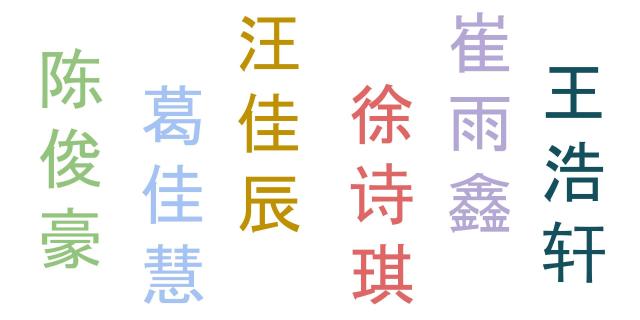
For the lists below, I removed all 单名 and just looked at 双名 characters. One of the things I was most excited to examine in this post was what characters tend to be found in the first vs. second positions. As you will see reflected below, some common characters used in names tend to occur more in one position, like 子 which is more prevalent in the first position. Others are more balanced. I bolded characters appearing in both positions.
Additional top 双名 can be found at the end of this post.
Top Two-Character Names
- 俊杰 jùnjié / 7
- 佳怡 jiāyí / 5
- 嘉欣 jiāxīn / 5
- 天宇 tiānyǔ / 5
- 浩然 hàorán / 5
- 婷婷 tíngtíng / 4
- 子杰 zǐjié / 4
- 安琪 ānqí / 4
Top First Characters
- 子 zǐ - son, child, seed, egg, small thing, 1st earthly branch, midnight, 11th solar month, year of the Rat, fourth of five orders of nobility, ancient Chinese compass point / 72
- 嘉 jiā - excellent, auspicious, to praise, to commend / 49
- 佳 jiā - beautiful, fine, good / 48
- 思 sī - to think, to consider / 44
- 一 yī - one, 1, single, a (article), as soon as, entire, whole, all, throughout / 40
- 俊 jùn - smart, eminent, handsome, talented / 40
- 雨 yǔ - rain / 36
- 天 tiān - day, sky, heaven / 34
- 宇 yǔ -room, universe / 34
- 晓 xiǎo - dawn, daybreak, to know, to let sb know, to make explicit / 34
Top Second Characters
- 宇 yǔ - room, universe / 48
- 豪 háo - grand, heroic / 45
- 杰 jié - hero, heroic, outstanding person, prominent, distinguished / 41
- 琪 qí - fine jade / 34
- 文 wén - language, culture, writing, formal, literary, gentle / 32
- 怡 yí - harmony, pleased / 30
- 婷 tíng - graceful / 29
- 轩 xuān - pavilion with a view, high, tall / 27
- 辰 chén - 5th earthly branch, 3rd solar month, year of the Dragon, ancient Chinese compass point / 26
- 欣 xīn - happy / 23
- 涵 hán - to contain, to include, culvert / 23
- 雨 yǔ - rain / 23
Female First Characters
- 佳 jiā - beautiful, fine, good / 38
- 嘉 jiā - excellent, auspicious, to praise, to commend / 31
- 思 sī - to think, to consider / 29
- 雨 yǔ - rain / 27
- 晓 xiǎo - dawn, daybreak, to know, to let sb know, to make explicit / 26
- 诗 shī - poem, poetry, verse / 24
- 梦 mèng - dream, to dream / 22
- 小 xiǎo - small, tiny, few, young / 20
- 欣 xīn - happy / 19
- 雅 yǎ - elegant / 19
Female Second Characters
- 琪 qí - fine jade / 30
- 婷 tíng - graceful / 29
- 怡 yí - harmony, pleased / 29
- 欣 xīn - happy / 21
- 雨 yǔ - rain / 21
- 君 jūn - monarch, lord, gentleman, ruler / 19
- 慧 huì - intelligent / 18
- 涵 hán - to contain, to include, culvert / 18
- 瑶 yáo - jade, precious stone, mother-of-pearl, nacre, precious / 17
- 莹 yíng - luster of gems / 16
Male First Characters
- 子 zǐ - son, child, seed, egg, small thing, 1st earthly branch, midnight, 11th solar month, year of the Rat, fourth of five orders of nobility, ancient Chinese compass point / 54
- 俊 jùn - smart, eminent, handsome, talented / 35
- 一 yī - one, 1, single, a (article), as soon as, entire, whole, all, throughout / 26
- 浩 hào - grand, vast (water) / 24
- 泽 zé - pool, pond, (of metals etc) luster, favor or beneficence, damp, moist / 22
- 宇 yǔ - room, universe / 20
- 明 míng - bright, clear, to understand, wise / 20
- 天 tiān - day, sky, heaven / 19
- 嘉 jiā - excellent, auspicious, to praise, to commend / 18
- 柏 bó - cedar, cypress / 17
Male Second Characters
- 豪 háo - grand, heroic / 45
- 宇 yǔ - room, universe / 44
- 杰 jié - hero, heroic, outstanding person, prominent, distinguished / 40
- 轩 xuān - pavilion with a view, high, tall / 21
- 辰 chén - 5th earthly branch, 3rd solar month, year of the Dragon, ancient Chinese compass point / 20
- 翔 xiáng - to soar, to glide / 19
- 文 wén - language, culture, writing, formal, literary, gentle / 17
- 霖 lín - continued rain / 17
- 铭 míng - to engrave, inscribed motto / 15
- 泽 zé - pool, pond, (of metals etc) luster, favor or beneficence, damp, moist / 14
- 鑫 xīn - prosperity / 14
- 龙 lóng - dragon, imperial / 14
Comparing Characters by Position

After examining the most popular characters by position, I was curious to look more specifically at which characters appear in one position but not the other. In this section I decided not to include lists separated by gender because it was getting to be too much information.
Exclusively First Characters
Below are the top characters that never appeared in the second position.
- 晓 xiǎo - dawn, daybreak, to know, to let sb know, to make explicit / 34
- 小 xiǎo - small, tiny, few, young / 24
- 紫 zǐ - purple, violet / 16
- 美 měi - beautiful, very satisfactory, good, to beautify, to be pleased with oneself / 15
- 若 ruò - to seem, like, as if / 14
- 智 zhì - wisdom, knowledge / 13
- 书 shū - book, letter, document, to write / 11
- 婉 wǎn - graceful, tactful / 11
- 振 zhèn - to shake, to flap, to vibrate, to resonate, to rise up with spirit, to rouse oneself / 11
- 永 yǒng - forever, always, perpetual / 11
- 秋 qiū - autumn, fall, harvest time / 11
Largest Deltas (First Position)
I also wanted to see characters that were found in both positions but for which there was a big difference in occurrence. I bolded characters that appeared both here and in the list above.
The math is formatted:
# times first position - # times second position = difference
- 子 zǐ - son, child, seed, egg, small thing, 1st earthly branch, midnight, 11th solar month, year of the Rat, fourth of five orders of nobility, ancient Chinese compass point / 72 - 10 = 62
- 思 sī - to think, to consider / 44 - 4 = 40
- 嘉 jiā - excellent, auspicious, to praise, to commend / 49 - 10 = 39
- 晓 xiǎo - dawn, daybreak, to know, to let sb know, to make explicit / 34 - 0 = 34
- 佳 jiā - beautiful, fine, good / 48 - 15 = 33
- 一 yī - one, 1, single, a (article), as soon as, entire, whole, all, throughout / 40 - 9 = 31
- 俊 jùn - smart, eminent, handsome, talented / 40 - 9 = 31
- 天 tiān - day, sky, heaven / 34 - 7 = 27
- 小 xiǎo - small, tiny, few, young / 24 - 0 = 24
- 诗 shī - poem, poetry, verse / 24 - 2 = 22
Exclusively Second Characters
- 豪 háo - grand, heroic / 45
- 霖 lín - continued rain / 22
- 然 rán - correct, right, so, thus, like this / 20
- 琦 qí - curio, valuable stone / 17
- 仪 yí - apparatus, rites, appearance, present, ceremony / 14
- 航 háng - boat, ship, craft, to navigate, to sail, to fly / 13
- 晴 qíng - clear, fine (weather) / 12
- 萱 xuān - orange day-lily / 12
- 帆 fān - sail, to gallop / 11 (Taiwan pr. fán)
- 璇 xuán - jade / 9
Largest Deltas (Second Position)
- 豪 háo - grand, heroic / 45 - 0 = 45
- 杰 jié - hero, heroic, outstanding person, prominent, distinguished / 41 - 3 = 38
- 琪 qí - fine jade / 34 - 2 = 32
- 婷 tíng - graceful / 29 - 6 = 23
- 辰 chén - 5th earthly branch, 3rd solar month, year of the Dragon, ancient Chinese compass point / 26 - 3 = 23
- 轩 xuān - pavilion with a view, high, tall / 27 - 5 = 22
- 霖 lín - continued rain / 22 - 0 = 22
- 涵 hán - to contain, to include, culvert / 23 - 2 = 21
- 然 rán - correct, right, so, thus, like this / 20 - 0 = 20
- 怡 yí - harmony, pleased / 30 - 13 = 17
- 君 jūn - monarch, lord, gentleman, ruler / 22 - 5 = 17
- 琦 qí - curio, valuable stone / 17 - 0 = 17
Gender Associations of Characters

This section is more experimental and exploratory. There are probably better ways to examine the gender association for characters, but I just wanted to take a quick look for fun, not develop a whole new analysis technique.
Gender Neutral Characters
Here I simply took the average of the ranks of each character for male names and female names. If a character was only found in male names or only found in female names, it would just end up with the overall rank of N/A.
The math is formatted:
(Female names rank + male names rank) ÷ 2 = average rank
- 子 zǐ - son, child, seed, egg, small thing, 1st earthly branch, midnight, 11th solar month, year of the Rat, fourth of five orders of nobility, ancient Chinese compass point
(12th + 2nd) ÷ 2 = 7th (82 times) - 嘉 jiā - excellent, auspicious, to praise, to commend
(6th + 18th) ÷ 2 = 12th (59 times) - 文 wén - language, culture, writing, formal, literary, gentle
(15th + 9th) ÷ 2 = 12th (58 times) - 宇 yǔ - room, universe
(30th + 1st) ÷ 2 = 15.5th (87 times) - 思 sī - to think, to consider
(8th + 29th) ÷ 2 = 18.5th (49 times) - 一 yī - one, 1, single, a (article), as soon as, entire, whole, all, throughout
(34th + 8th) ÷ 2 = 21st (51 times) - 天 tiān - day, sky, heaven
(31st + 12th) ÷ 2 = 21.5th (44 times) - 雨 yǔ - rain
(2nd + 45th) ÷ 2 = 23.5th (63 times) - 佳 jiā - beautiful, fine, good
(1st + 47th) ÷ 2 = 24th (68 times) - 恩 ēn - favor, grace, kindness
(37th + 30th) ÷ 2 = 33.5th (33 times)
Female-Leaning Characters
For this section, I looked at characters in female names that did not appear in male names. This isn’t a perfect technique, but I think it is still interesting to see the results.
- 婷 tíng - graceful / 5th (39 times)
- 诗 shī - poem, poetry, verse / 16th (26 times)
- 静 jìng - still, calm, quiet, not moving / 18th (23 times)
- 莹 yíng - luster of gems / 28th (20 times)
- 丽 lì - beautiful / 29th (19 times)
- 依 yī - to depend on, to comply with or listen to sb, according to, in the light of / 35th (17 times)
- 妍 yán - beautiful / 36th (17 times)
- 媛 yuán - beautiful / 40th (16 times)
- 月 yuè - moon, month / 41st (16 times)
- 紫 zǐ - purple, violet / 43rd (16 times)
Male-Leaning Characters
Likewise, for this section I chose characters that appeared in male names but not female names. I actually know women with 龙 and 伟 in their names, so it’s important to remember that leaning male =/= only found in men’s names. There are always exceptions!
- 豪 háo - grand, heroic / 3rd (48 times)
- 浩 hào - grand, vast (water) / 7th (35 times)
- 龙 lóng - dragon, imperial / 28th (17 times)
- 伟 wěi - big, large, great / 36th (14 times)
- 峻 jùn - (of mountains) high, harsh or severe / 38th (13 times)
- 耀 yào - brilliant, glorious / 42nd (13 times)
- 钧 jūn - 30 catties, great, your (honorific) / 44th (13 times)
- 成 chéng - to succeed, to finish, to complete, to accomplish, to become, to turn into, to be all right, one tenth / 48th (12 times)
- 振 zhèn - to shake, to flap, to vibrate, to resonate, to rise up with spirit, to rouse oneself / 53rd (11 times)
- 飞 fēi - to fly / 54th (11 times)
While looking at gender was fun, in the future I’d really like to look at tones/tone combinations, open vs. close syllables, and more. I’m still thinking about the best way to do this.
Surnames
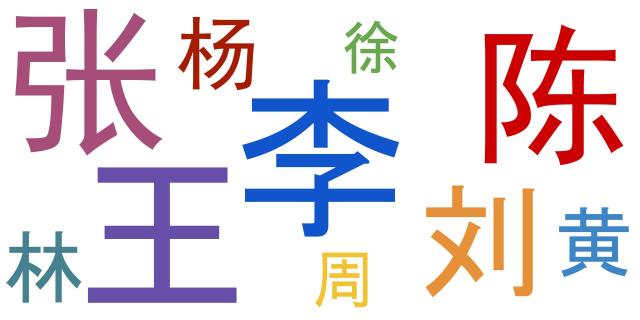
Since surname rankings are actually known, I thought it would be interesting to briefly compare my dataset to the true populations.
Top Surnames
- 李 Lǐ / 240
- 王 Wáng / 206
- 张 Zhāng / 186
- 陈 Chén / 173
- 刘 Liú / 147
- 杨 Yáng / 94
- 林 Lín / 91
- 黄 Huáng / 88
- 周 Zhōu / 69
- 徐 Xú / 66
Mainland Top Surnames
- 李 Lǐ
- 王 Wáng
- 张 Zhāng
- 刘 Liú
- 陈 Chén
- 杨 Yáng
- 赵 Zhào
- 黄 Huáng
- 周 Zhōu
- 吴 Wú
Taiwan Top Surnames
- 陈 Chén
- 林 Lín
- 黄 Huáng
- 张 Zhāng
- 李 Lǐ
- 王 Wáng
- 吴 Wú
- 刘 Liú
- 蔡 Cài
- 杨 Yáng
What stood out to me most was 林 making #7 on my list. I suspect this is due to the inclusion of Taiwanese names. In Mainland China it actually ranks around #16 I believe. 赵 didn’t make the top 10, but I think it was actually #11, so that’s not too far off.
About the Data Cont’
For my original posts 1.5 years ago, I had difficulty maintaining a gender balance and decided to add male names from other types of sources as a supplement. I have since regretted that choice, so this time I worked hard to maintain balance without using unrelated sources. One result of this is that there are names in the original dataset that do not appear in this dataset, so even though the new dataset has more names, it’s possible that there could be fewer occurrences of some characters.
I did my best to remove duplicate individuals (not duplicate names!) and remove stage names that do not sound like real names (or replace them with real names). However, I did not try to swap out all stage names for birth names because that would have been too difficult and time consuming. I also made the assumption that any four-character name could be segmented into two surname characters and two given name characters.
It’s important to note that these names are not necessarily representative of the 15-30 population as a whole. Idols or trainees might change their names to something sounding more cool or hip, and like I mentioned, it simply wasn’t feasible for me to find everyone’s birth name. And my data collection didn’t take into account things like geography/population spread or keep track of ages (but I did for the most part avoid any shows older than 5 years and groups with members 30+).
Extended Lists
Top Given Name Characters
28 星 xīng - star, heavenly body / 31
29 梦 mèng - dream, to dream / 31
30 倩 qiàn - pretty, winsome / 29
31 涵 hán - to contain, to include, culvert / 29
32 艺 yì - skill, art / 29
33 雅 yǎ - elegant / 29
34 雪 xuě - snow / 29
35 君 jūn - monarch, lord, gentleman, ruler / 28
36 翔 xiáng - to soar, to glide / 27
37 霖 lín - continued rain / 27
38 哲 zhé - wise, a sage / 26
39 梓 zǐ - Catalpa kaempferi (type of tree), printing blocks / 26
40 羽 yǔ - feather, 5th note in pentatonic scale / 26
41 诗 shī - poem, poetry, verse / 26
42 凯 kǎi - triumphant, victorious / 25
43 家 jiā - home, family / 24
44 小 xiǎo - small, tiny, few, young / 24
45 洋 yáng - ocean, vast, foreign, silver dollar or coin / 24
46 铭 míng - to engrave, inscribed motto / 24
47 奕 yì - abundant, graceful / 23
48 柏 bó - cedar, cypress / 23
49 静 jìng - still, calm, quiet, not moving / 23
50 馨 xīn - fragrant / 23
51 丹 dān - red, pellet, powder, cinnabar / 22
52 安 ān - content, calm, still, quiet, safe, secure, in good health, to pacify, to harbor (good intentions), security, safety, peace / 22
53 洁 jié - clean / 22
54 然 rán - correct, right, so, thus, like this / 22
55 瑶 yáo - jade, precious stone, mother-of-pearl, nacre, precious / 22
56 心 xīn - heart, mind, intention, center, core / 21
57 扬 yáng - to raise, to hoist, scattering (in the wind), to flutter / 21
58 玉 yù - jade / 21
59 阳 yáng - sun, male principle / 21
60 源 yuán - root, source, origin / 20
61 琦 qí - curio, valuable stone / 20
62 瑞 ruì - lucky, auspicious, propitious, rayl / 20
63 莹 yíng - luster of gems / 20
64 丽 lì - beautiful / 19
65 宁 níng - peaceful, to pacify / 19
66 语 yǔ - dialect, language, speech / 19
67 云 yún - cloud / 18
68 敏 mǐn - quick, nimble, agile, clever, smart / 18
69 琳 lín - gem / 18
70 睿 ruì - astute, perspicacious, farsighted / 18
71 菲 fēi - luxuriant (plant growth), rich with fragrance / 18
72 辉 huī - splendor, to shine upon / 18
73 颖 yǐng - head of grain, husk, tip, point, clever, gifted, outstanding / 18
74 依 yī - to depend on, to comply with or listen to sb, according to, in the light of / 17
75 妍 yán - beautiful / 17
76 希 xī - to hope, to admire / 17
77 昊 hào - vast and limitless, the vast sky / 17
78 超 chāo - to exceed, to overtake, to surpass, to transcend, to pass, to cross, ultra, super / 17
79 龙 lóng - dragon, imperial / 17
80 东 dōng - east , host / 16
81 凡 fán - ordinary, commonplace, mundane, temporal, of the mortal world, all, whatever, altogether, gist, outline, note of Chinese musical scale / 16
82 媛 yuán - beautiful / 16
83 宏 hóng - great, magnificent / 16
84 志 zhì - aspiration, ambition, the will / 16
85 昕 xīn - dawn / 16
86 月 yuè - moon, month / 16
87 瑜 yú - excellence, luster of gems / 16
88 紫 zǐ - purple, violet / 16
89 航 háng - boat, ship, craft, to navigate, to sail, to fly / 16
90 钰 yù - treasure, hard metal / 16
91 雯 wén - multicolored clouds / 16
92 元 yuán - currency unit, first, original, primary, fundamental, constituent, part, era / 15
93 廷 tíng - palace courtyard / 15
94 承 chéng - to bear, to carry, to hold, to continue, to undertake, to take charge, owing to, due to, to receive / 15
95 晴 qíng - clear, fine (weather) / 15
96 美 měi - beautiful, very satisfactory, good, to beautify, to be pleased with oneself / 15
97 言 yán - words, speech, to say, to talk / 15
98 逸 yì - to escape, leisurely, outstanding / 15
Top Single-Character Names
12 佳 jiā - beautiful, fine, good / 5
13 倩 qiàn - pretty, winsome / 5
14 凡 fán - ordinary, commonplace, mundane, temporal, of the mortal world, all, whatever, altogether, gist, outline, note of Chinese musical scale / 5
15 宇 yǔ - room, universe / 5
16 帅 shuài - handsome, graceful, smart, commander in chief / 5
17 悦 yuè - pleased / 5
18 杰 jié - hero, heroic, outstanding person, prominent, distinguished / 5
19 洁 jié - clean / 5
20 聪 cōng - wise, clever, sharp-witted, intelligent, acute, quick at hearing / 5
21 萌 méng - to sprout, to bud / 5
22 霖 lín - continued rain / 5
Top Two-Character Names
9 丽娜 lìnà / 3
10 丹妮 dānnī / 3
11 佳慧 jiāhuì / 3
12 佳欣 jiāxīn / 3
13 依依 yīyī / 3
14 俊毅 jùnyì / 3
15 博文 bówén / 3
16 嘉宝 jiābǎo / 3
17 嘉怡 jiāyí / 3
18 媛媛 yuányuán / 3
19 子铭 zǐmíng / 3
20 子龙 zǐlóng / 3
21 家豪 jiāháo / 3
22 心怡 xīnyí / 3
23 心雨 xīnyǔ / 3
24 思佳 sījiā / 3
25 思雨 sīyǔ / 3
26 晨曦 chénxī / 3
27 梓豪 zǐháo / 3
28 梦瑶 mèngyáo / 3
29 欣妤 xīnyú / 3
30 浩宇 hàoyǔ / 3
31 美琪 měiqí /3
32 诗琪 shīqí / 3
33 雨晴 yǔqíng / 3
34 雨航 yǔháng / 3
35 雪莹 xuěyíng / 3
36 静怡 jìngyí / 3
Well, if you made it to the end, congratulations! You are a brave soul. But seriously, thanks so much for reading all of this monster of a post. I hope you leave knowing at least a bit more about Chinese names.
Some of my past posts about Chinese names seem to have become popular among people in the writing community (writeblr???) as references. I’m very happy that people are interested in learning about Chinese names to name their original characters! However, I’m sure some people are also interested in creating characters of the Chinese diaspora. The diaspora is HUGE, but I wanted to shed some light on Chinese American names.
Disclaimer: I am just one Chinese American drawing on the stories of my family, friends, and classmates. This can’t certainly represent all Chinese Americans, so keep that in mind. My focus is primarily on people born and/or raised in the US as opposed to adult immigrants. I imagine a lot of this post also applies to Chinese Canadians, Chinese Australians, etc.
Name Formats
Our lovely “model” for today will be the fictional character of Jane/Jiayi Wang (王佳怡). Here are some basic name structures I’ve encountered throughout my life:
- Jane Jiayi Wang
One very typical name format would be Western first name, Chinese middle name, last name. I don’t have any actual data on it, but if you told me that this format was the most common for US-born Chinese Americans, I would believe you. Today, it feels like I’m seeing more and more people use their Chinese middle names alongside their Western first names professionally or on social media. - Jiayi Wang
Some Chinese Americans do not have a Western-style name. This could be the case for someone born in the US or someone who immigrated. Often people with this name format may go by a Western name like Jane even if it’s not part of their legal name. They could also go by an abbreviation of their Chinese name or a nickname derived from their Chinese name. - Jane Wang / Jane Amelia Wang
Not all Chinese Americans have a Chinese name as part of their legal name. Some might have Western first and middle names. Someone without a Chinese name as part of their legal name might still have a Chinese name that just isn’t “official,” or they might not have a Chinese name at all. - Jiayi Jane Wang
I don’t think this name format is as common as the ones above. I’ve definitely seen people who immigrated as adults use this format, maybe if they adopted a Western name for convenience but still want to use their native name. However, the name they go by may not reflect their legal name. - Jane Li-Wang / Jane Li Wang
These examples (which are rarer in my experience) incorporate both parents’ surnames, one by hyphenating and the other by making one parent’s surname the middle name. I’ve read that recently in China, a growing number of parents (but still a small number) are passing on both surnames (like 李王佳怡).
While I don’t personally know many people who fit this description, sometimes parents will select Chinese and Western names that are similar. This could be a loose similarity like Jane/Jiayi or a closer similarity like Lynn/Lin(g). Take for example the pair Eileen/Ailing, as in Eileen Chang (张爱玲) or Eileen Gu (谷爱凌). Another example of a close match is Wilber Pan/Pan Weibo (潘玮柏).
Another option is a Chinese name as a first name that was picked to be easy for English speakers to pronounce. Names like Ming or Kai are short and easy to pronounce.
More on Chinese Names
- As I said, not all Chinese Americans have a Chinese name. For some, this might not be a big deal, but for others, it could be a sensitive issue.
- Some have a Chinese name but may not know how it’s written, what it means, etc. A lot of Chinese Americans are mostly illiterate in Chinese and may not feel very comfortable speaking the language either. In my experience, it’s not uncommon for Chinese Americans to only be able to write their Chinese name and nothing else. There’s literally a whole song about this phenomenon.
- Sometimes one may not know their Chinese name at all. Some Chinese Americans rarely if ever use their Chinese name. They may even feel little or no connection to the name. If their parents were born in the US or immigrated at a young age, it’s likely the Chinese name was given by grandparents. In this situation, it’s possible the parents don’t know the Chinese name of their child either.
- Some Chinese Americans are interested in reclaiming their Chinese name. I’ve seen people add their Chinese names to their social media or even consider switching to going by their Chinese name.
- Others don’t like being made to feel like a Western name such as Jane isn’t their real name (perpetual foreigner stereotype, anyone?). Acting like Jane isn’t someone’s “real name” and you must uncover their “more authentic” Chinese name is very icky. Jane and Jiayi are both real and valid.
Important: Due to some of the reasons above (and probably others) some Chinese Americans may not like it when others ask them about their Chinese names. It may be something very personal that they prefer to keep private, something they feel no connection to, something they don’t have in the first place, etc.
Also, someone isn’t turning their back on their heritage because they prefer going by Jane over Jiayi. While it’s true that some people feel pressured into going by a Western name that’s easier for others to pronounce (and this SUCKS), no one should be forced to go by their Chinese name if they don’t want to. People should respect and learn to pronounce others’ names, but as I’ve seen pointed out on Twitter, some people would rather go by Jane than have to hear Jiayi butchered day after day. So always respect personal choice and don’t pressure others to adopt a Western name or go by their Chinese name against their will.
Adopting Mispronunciations: Liu, Wang, Zhang, Zhao, etc.
I know Chinese Americans who pronounce their names or surnames “incorrectly” to conform with American English pronunciations of these names. For example, take Bowen Yang (杨伯文) or Lucy Liu (刘). I’ve also observed bearers of common surnames Wang, Zhang, and Zhao going by the Americanized pronunciations of their surnames.
Sometimes this can be a little confusing because I’m honestly not sure if I should pronounce their name the Americanized way or the native Chinese way. For instance, I had a classmate who reluctantly pronounced her surname Liu more like Lu but wished people would say it more accurately. But I also had another classmate with the last name Wang who didn’t seem to care about the pronunciation.
Romanization
This post wouldn’t be complete without mentioning that Chinese American names are diverse when it comes to romanization system used. First of all, there are many Chinese languages. Secondly, you have people immigrating from different countries with different romanization standards. Additionally, practices change over time, so people whose ancestors immigrated decades ago might have a name that uses a romanization system no longer in use. I’m sure there are even people whose full names contain traces of multiple romanization systems.
After writing most of this post, I came across an interesting piece by Emma Woo Louie, Name Styles and Structure of Chinese American Personal Names. (She also has a whole website about Chinese American surnames!) The article is almost 30 years old, but it was an interesting read and still relevant today. It includes a discussion on the different ways to write two-syllable names.
- Separated by a space
- With a hyphen between
- No separation
For our example Jane Wang, you might expect to see:
- Jane Chiayi Wang
- Jane Chia Yi Wang
- Jane Chia-yi Wang
- Jane Chia-Yi Wang
I used Wade-Giles style romanization above because that’s what I typically see used alongside hyphens. Learn more about it by reading another post of mine!
Emma Woo Louie’s article also mentions the use of initials (like J.Y. Wang/C.Y. Wang for our example). I initially did not think to include this name format—I think it’s less in style now and it didn’t occur to me—but I have encountered it before.
I have also met Chinese Americans whose surnames were altered accidentally during the immigration process, thus leaving families with “misspelled” surnames. Certainly makes for an interesting family story!
Adoptees
Disclaimer: I’m not an adoptee and do not want to speak over adoptees. But I wanted to add a section on adoptee names. Thinking back, most Chinese adoptees I’ve met do not have anything in their legal name that is Chinese, but there are exceptions to this—I do know some who have names of the format Jiayi Smith or Jane Jiayi Smith.
A former classmate of mine knew the story and meaning behind her name (it was given by the workers at the orphanage she was adopted from), but I don’t know how common her experience is. My assumption is that most adoptive parents don’t know Chinese, so they probably won’t know much about their child’s Chinese name, and thus the child might not know much either.
I’ve read some essays and other thoughts by adoptees about their relationships with their Chinese names that I’ll link below. I encourage you to check them out!
Names | 姓名 by Kimberly Rooney | 高小荣
Twitter thread by Lydia X. Z. Brown
Stuck in Racial Limbo by Hazel Yafang Livingston
Multiracial Chinese Americans
For multiracial Chinese people, there is a whole world of other possibilities for names, but a lot of what I wrote above can apply as well. Every person and family is different! Here are just a few general trends I’ve observed:
- Non-Chinese first name plus legal Chinese middle name *
- Has Chinese name that isn’t part of legal name *
- No Chinese name at all *
- Has mother’s maiden name as a middle name +
- Hyphenated surname
- I’m sure there are multiracial Chinese people with Chinese given names, but in my experience, it’s not common here
*Surname may or may not be of Chinese origin
+If mother is Chinese and father is not
Following typical naming conventions here, it’s more likely someone has a Chinese surname if their father is Chinese, but this isn’t true in all cases. In the case that someone has their father’s non-Chinese surname, they might use their mother’s Chinese surname in situations where they are going by their Chinese name. Like Jane Jiayi Smith might use her mother’s surname 王 and go by 王佳怡 in Chinese class, even thought Wang doesn’t appear in her legal name.
Fellow Chinese diaspora folks, feel free to add on with contributions about names of the diaspora in your country/community/family/etc.!
A Guide to Taiwanese Name Romanization
Have you ever wondered why there are so many Changs when the surname 常 is not actually that common? Have you ever struggled to figure out what sound “hs” is? Well don’t worry! Today we are going to go over some common practices in transliterating names from Taiwan.
With some recent discussion I’ve seen about writing names from the Shang-Chi movie, I thought this was the perfect time to publishe this post. Please note that this information has been compiled from my observations–I’m sure it’s not completely extensive. And if you see any errors, please let me know!
According to Wikipedia, “the romanized name for most locations, persons and other proper nouns in Taiwan is based on the Wade–Giles derived romanized form, for example Kaohsiung, the Matsu Islands and Chiang Ching-kuo.” Wade-Giles differs from pinyin quite a bit, and to make things even more complicated, transliterated names don’t necessarily follow exact Wade-Giles conventions.
Well, Wikipedia mentioned Kaohsiung, so let’s start with some large cities you already know of!
[1] B → P
台北 Taibei → Taipei
[2] G → K
[3] D → T
In pinyin, we have the “b”, “g”, and “d” set (voiceless, unaspirated) and the “p”, “k”, and “t” set (voiceless, aspirated). But in Wade-Giles, these sets of sounds are distinguished by using a following apostrophe for the aspirated sounds. However, in real life the apostrophe is often not used.
We need some more conventions to understand Kaohsiung.
[4] ong → ung (sometimes)
[5] X → Hs or Sh
高雄 Gaoxiong → Kaohsiung
I wrote “sometimes” for rule #4 because I am pretty sure I have seen instances where it is not followed. This could be due to personal preference, historical reasons, or influence from other romanization styles.
Now some names you are equipped to read:
王心凌 Wang Xinling → Wang Hsin-ling
徐熙娣 Xu Xidi → Shu/Hsu Hsi-ti (I have seen both)
黄鸿升 Huang Hongsheng → Huang Hung-sheng
龙应台 Long Yingtai → Lung Ying-tai
宋芸樺 Song Yunhua → Sung Yun-hua
You might have learned pinyin “x” along with its friends “j” and “q”, so let’s look at them more closely.
[6] J → Ch
[7] Q → Ch
范玮琪 Fan Weiqi → Fan Wei-chi
江美琪 Jiang Meiqi → Chiang Mei-chi
郭静 Guo Jing → Kuo Ching
邓丽君 Deng Lijun → Teng Li-chun
This is similar to the case for the first few conventions, where an apostrophe would distinguish the unaspirated sound (pinyin “j”) from the aspirated sound (pinyin “q”). But in practice these ultimately both end up as “ch”. I have some disappointing news.
[8] Zh → Ch
Once again, the “zh” sound is the unaspirated correspondent of the “ch” sound. That’s right, the pinyin “zh”, “j”, and “q” sounds all end up being written as “ch”. This can lead to some…confusion.
卓文萱 Zhuo Wenxuan → Chuo Wen-hsuan
陈绮贞 Chen Qizhen → Chen Chi-chen
张信哲 Zhang Xinzhe → Chang Shin-che
At least now you finally know where there are so many Changs. Chances are, if you meet a Chang, their surname is actually 张, not 常.
Time for our next set of rules.
[10] C → Ts
[11] Z → Ts
[12] Si → Szu
[13] Ci, Zi → Tzu
Again we have the situation where “c” is aspirated and “z” is unaspirated, so the sounds end up being written the same.
曾沛慈 Zeng Peici → Tseng Pei-tzu
侯佩岑 Hou Peicen → Hou Pei-tsen
周子瑜 Zhou Ziyu → Chou Tzu-yu
黄路梓茵 Huang Lu Ziyin → Huang Lu Tzu-yin
王思平 Wang Siping → Wang Szu-ping
Fortunately this next convention can help clear up some of the confusion from above.
[14] i → ih (zhi, chi, shi)
[15] e → eh (-ie, ye, -ue, yue)
Sometimes an “h” will be added at the end. So this could help distinguish some sounds. Like you have qi → chi vs. zhi → chih. There could be other instances of adding “h”–these are just the ones I was able to identify.
曾之乔 Zeng Zhiqiao → Tseng Chih-chiao
施柏宇 Shi Boyu → Shih Po-yu
谢金燕 Xie Jinyan → Hsieh Jin-yan
叶舒华 Ye Shuhua → Yeh Shu-hua
吕雪凤 Lü Xuefeng → Lü Hsueh-feng
Continuing on, a lot of the conventions below are not as consistently used in my experience, so keep that in mind. Nevertheless, it is useful to be familiar with these conventions when you do encounter them.
[16] R → J (sometimes)
Seeing “j” instead of “r” definitely confused me at first. Sometimes names will still use “r” though, so I guess it is up to one’s personal preferences.
任贤齐 Ren Xianqi → Jen Hsien-chi
任家萱 Ren Jiaxuan → Jen Chia-hsüan
张轩睿 Zhang Xuanrui → Chang Hsuan-jui
[17] e → o (ke, he, ge)
I can see how it would easily lead to confusion between ke-kou, ge-gou, and he-hou, so it’s important to know. I’ve never seen this convention for pinyin syllables like “te” or “se” personally.
柯震东 Ke Zhendong → Ko Chen-tung
葛仲珊 Ge Zhongshan→ Ko Chung-shan
[18] ian → ien
[19] Yan → Yen
I’ve observed that rule 18 seems more common than 19 because I see “yan” used instead of “yen” a fair amount. I’m not really sure why this is.
柯佳嬿 Ke Jiayan → Ko Chia-yen
田馥甄 Tian Fuzhen → Tien Fu-chen
陈建州 Chen Jianzhou → Chen Chien-chou
吴宗宪 Wu Zongxian → Wu Tsung-hsien
[20] Yi → I (sometimes)
I have seen this convention not followed pretty frequently, but two very famous names are often in line with it.
蔡英文 Cai Yingwen → Tsai Ing-wen
蔡依林 Cai Yilin → Tsai I-lin
[21] ui → uei
I have seen this convention used a couple times, but “ui” seems to be much more common.
蔡立慧 Cai Lihui → Tsai Li-huei
[22] hua → hwa
This is yet another convention that I don’t always see followed. But I know “hwa” is often used for 华 as in 中华, so it’s important to know.
霍建华 Huo Jianhua → Huo Chien-hwa
[23] uo → o
This is another example of where one might get confused between the syllables luo vs. lou or ruo vs. rou. So be careful!
罗志祥 Luo Zhixiang → Lo Chih-hsiang
刘若英 Liu Ruoying → Liu Jo-ying
徐若瑄 Xu Ruoxuan → Hsu Jo-hsuan
[24] eng → ong (feng, meng)
I think this rule is kinda cute because some people with Taiwanese accents pronounce meng and feng more like mong and fong :)
权怡凤 Quan Yifeng → Quan Yi-fong
[25] Qing → Tsing
I am not familiar with the reasoning behind this spelling, but 国立清华大学 in English is National Tsing Hua University, so this spelling definitely has precedence. But I also see Ching too for this syllable.
吴青峰 Wu Qingfeng→ Wu Tsing-fong
[26] Li → Lee
Nowadays a Chinese person from the Mainland would probably using the Li spelling, but in other areas, Lee remains more common.
李千那 Li Qianna → Lee Chien-na
[27] Qi → Chyi
I have noticed this exception. However, I’ve only personally noticed it for this surname, so maybe it’s just a convention for 齐.
齐秦 Qi Qin → Chyi Chin
齐豫 Qi Yu → Chyi Yu
[28] in ←→ ing
In Taiwanese Mandarin, these sounds can be merged, so sometimes I have noticed ling and lin, ping and pin, etc. being used in place of each other. I don’t know this for sure, but I suspect this is why singer A-Lin is not A-Ling (her Chinese name is 黄丽玲/Huang Liling).
[29] you → yu
I personally haven’t noticed these with other syllables ending in “ou,” only with the “you” syllable.
刘冠佑 Liu Guanyou → Liu Kuan-yu
曹佑宁 Cao Youning → Tsao Yu-ning
There is a lot of variation with these transliterated names. There are generally exceptions galore, so keep in mind that all this is general! Everyone has their own personal preferences. If you just look up some famous Taiwanese politicians, you will see a million spellings that don’t fit the 28 conventions above. Sometimes people might even mix Mandarin and another Chinese language while transliterating their name.
Anyway, if any of you know why 李安 is romanized as Ang Lee, please let me know because it’s driving me crazy.
Note: The romanized names I looked while writing this post at were split between two formats, capitalizing the syllable after the hyphen and not capitalizing this syllable. I chose to not capitalize for all the names for the sake of consistency. I’m guessing it’s a matter of preference.
Some of my most popular posts on this blog have to do with Chinese names. It seems like a lot of people who reblog those posts enjoy writing and are saving the posts as resources for naming their characters. So, I wanted to share some additional resources that I’ve found and used.
Resource #1: Name104
This site reflects names from Taiwan. It has quite a few different pages/features to explore. Just make sure you only enter in traditional characters–it won’t work properly with simplified characters.
First is the name generating tool (線上取名工具軟體).

You can specify the surname, if you want a one character given name, the second character of the name (aka first character of the given name), number of strokes, and things relating to luck. The specify second character feature is really useful for if you want a common 字辈 across names. The site will generate a bunch of names, and you can click each to learn more.
The tool I find most useful is the name similarity tool (名字相似度查詢). You enter a given name, and it will show a popularity score as well as lists of common names with the characters you included. The score is people/million, taken from college (I think) entrance exam takers over a 15 year period.
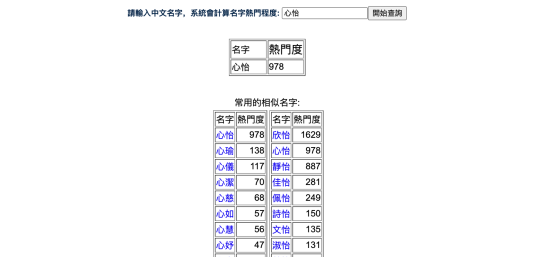
The default name when you click on the page is 心怡. This one is pretty popular. If you know you really want a name with the character 怡, you can enter in 怡怡 so it will show all the most popular names with this character (both in the first or second position), like below:
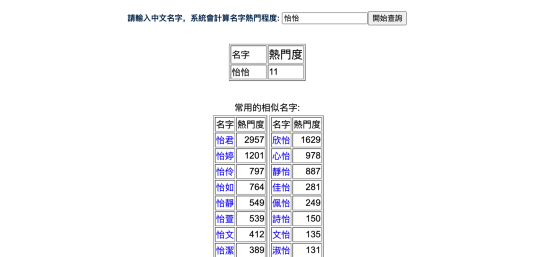
Some other pages of interest are the list of most popular characters in names (常用名字[單字]) and the list of most popular names (常見名字). You can click on each character or name to see more. According to the website, about 90% of names are made up of the top 500 most popular characters, and the 1000 most popular names made up 22% of people. So if you want a “normal” sounding name, this is a great resource. If you’re wondering, the most common character is apparently 怡, with the most popular name being 怡君!
Resource #2 NameChef
This site is available in English and Chinese, so it’s relatively accessible for people who don’t speak Chinese. However, some of the specific information on individual names is only in Chinese. Also, that it seems to default to displaying traditional characters when you are in English mode, so you may need to ensure you are entering traditional characters in some of the later steps.
First I’ll discuss the name generator. This feature is great because it allows you to specify a region (Mainland, Hong Kong, Macau, Taiwan, Singapore, Malaysia, or any). Different regions have different naming trends. I can’t vouch entirely for how good this feature is, but I think it’s so cool that they offer it.

Another cool feature is that you can specify different traits. I can imagine this would be great for those of you looking for a name for an original character. You can also skip this step if you don’t have a preference.

Next you can enter a surname and a character you want included in the given name. As you can see, you can pick to include a character but not specify placement, specify the first character, or specify the second character. This is also good for 字辈 or if you’ve selected a character you want to include but are not sure how to finish formulating the name.
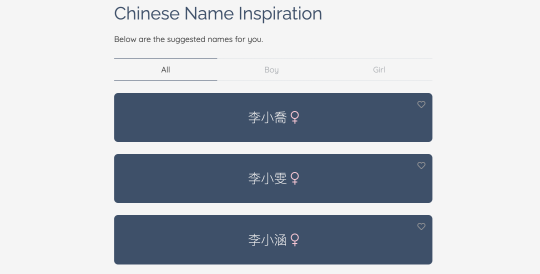
Here’s my list of names. It happens to just have female ones at the top, but since I’m on the “all” tab, it’s actually displaying a mix.
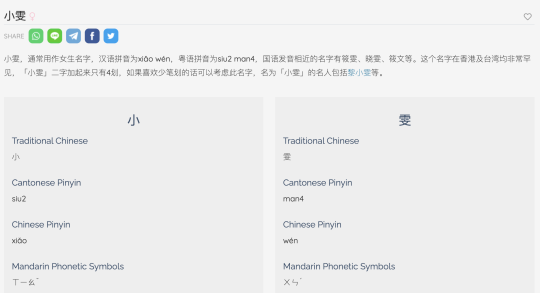
If you click on a name, you can see some more information. Further down, the page also shows stuff like gender, popularity of the name by region, and names with similar pronunciation. However, I noticed that the site isn’t the best at noting which names are more gender neutral, so this is something to keep in mind.
This site also has pages on popular namesandcharacters by region! I find this stuff very interesting. The lists definitely reflect some trends in names I’ve observed by region, so even though I don’t know the data source, it seems fairly accurate.

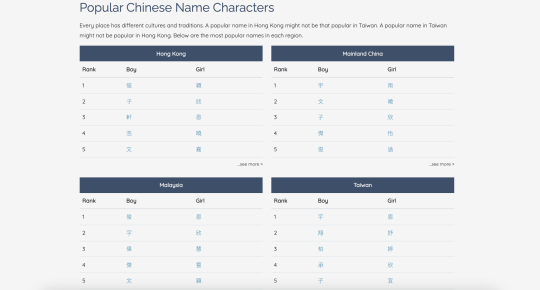
Resource #3: Provincial Databases (重名查询)
Some provinces have websites where you can enter names and see the number of people with the name. Sometimes they include a gender breakdown too. There is actually a government site for the whole country that does this, but I think you have to be a Chinese citizen to use it. Luckily, some of the individual provincial services don’t require this. There are probably more sites for other provinces, but I’m just going to list a few. Guangdong, Henan, and Shandong are the three biggest provinces in China, so those are always good ones to start with. These sites are all in Chinese.
- Shandong (city breakdown)
- Jiangsu (gender breakdown)
- Henan (search by whole province or city/county)
- Jiangxi (gender, age, and even astrological breakdown)
- Guangdong (gender breakdown)
- Liaoning (gender and city breakdown)
If you use one of these sites, first I recommend trying a super common name like 张伟 so that you can use that information to interpret your results. Also, I believe for all of these site you have to enter a surname, so you can just pick a common one like 王, 李, or 张 (or whatever the most prevalent surname is for that individual province).
I hope these resources are helpful to you! If you know of other good websites, I’d love to see them too.
